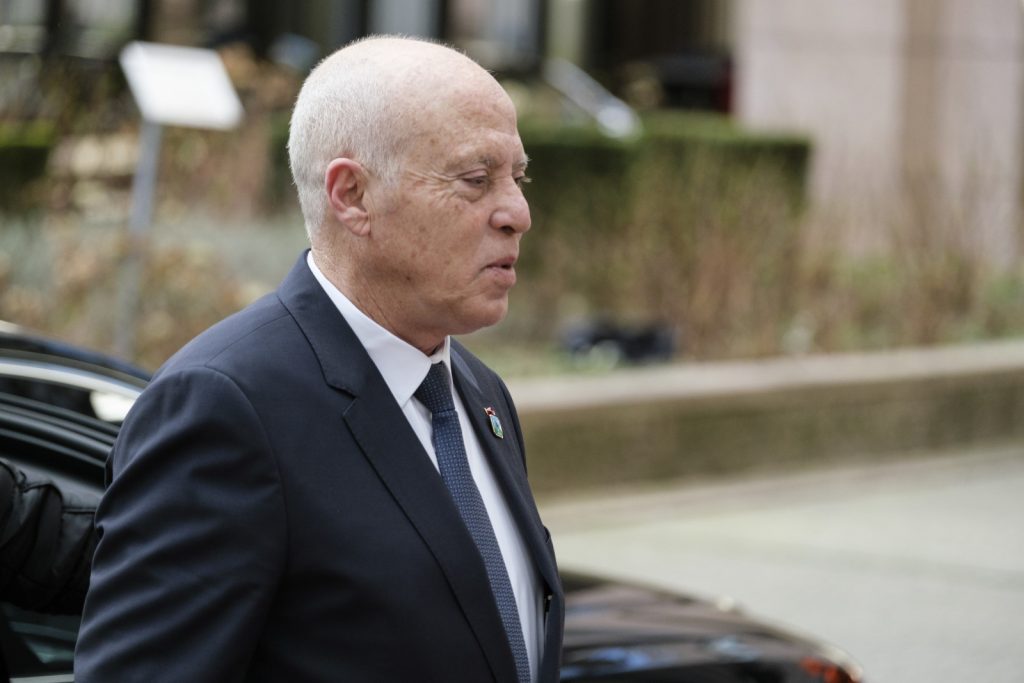Hundreds of Tunisians gather to celebrate their Independence Day by shouting slogans with banners and Tunisian flags in their hands on Habib Bourguiba Street in Tunis, Tunisia on March 20, 2023. (Photo by Yassine Gaidi/Anadolu Agency via Getty Images)
Tunisia’s President Kais Saied alleged on 21 February that immigration from sub-Saharan African countries is aimed at changing Tunisia’s demographic composition.
This happens while Tunisia is faced with soaring import prices, a widening trade deficit, high debt service costs and a new agreement with the International Monetary Fund is billed as the only way to resolve the balance of payments crisis. Beyond the global outrage that his words provoked, many argued that it’s simply the expected outcome of new European Union migration policies.
This is a new episode of the counter-revolution at play in the palaces of Tunis, aiming to shrink recently acquired democratic rights and bring back a national bourgeoisie mutilated by its lack of political imagination. Migrants represent an opportunity to re-order Tunisien society on Saied’s vision.
To fully understand what is happening in Tunis, a short detour to Bruxelle is necessary. The EU in charge of harmonising migration policy for its members has been the target of European populist movements that complained about its inefficiency to regulate migratory movement coming out of Africa. (For Ukrainians, the question was raised in different terms and vocabularies). Europe has now decided to partner with North African regimes to externalise their borders. This externalisation agenda outsources the responsibility to protect asylum seekers, refugees and migrants to EU border states such as Turkey, Tunisia, Algeria and Morocco.
North Africa was once a place of transit for sub-Saharan Africans aiming for Europe. Now they are stuck in Tangier, Algiers or Tunis, landlocked by newly financed and militarised coastal guards that de facto work for the EU agenda. Neighbouring Algeria, for instance, is known to capture migrants in cities and drive them to the desertic southern borders without water, food or subsidies, forcing them to find their way back home in the Sahara desert. The result of these policies is the rise of African migrants on Tunisian streets and a reinforcement of the Tunisian security apparatus. Those migrants are not an issue for Saied; they represent an opportunity to finance and develop a more efficient security grip on Tunisians using EU money.
 Under scrutiny: Tunisia’s President Kais Saied. (Photo by Thierry Monasse/Getty Images))
Under scrutiny: Tunisia’s President Kais Saied. (Photo by Thierry Monasse/Getty Images))
The rise of a power that aims to fundamentally restructure Tunisien liberties cannot be understood without knowledge of the country’s recent revolutionary period. In 2011, the conservative forces of then president Ben Ali lost power. The revolutionary period has left a lot of issues unsolved; inflation and unemployment remain because different assemblies were elected without being able to fix the economy. Despite efforts to implement a liberal democratic model, it has failed to meet the socio-economic demands made by Tunisians during the December 2010 to January 2011 uprising.
Saied’s counter-revolutionary forces came up with easy and anti-democratic solutions for the people, promising to deliver faster justice and better economics. Under Saeid’s rule, they reorganised and re-conquered Tunisien centres of power one by one. In March last year, the president sacked top council judges, whose job was to ensure judicial independence, and replaced them with judges he chose. A month after he dissolved the parliament and accused opposition leaders of “plots against state security”, he moved to rule by decree before rewriting the Constitution and getting it adopted by effectively 25 % of the population in a referendum. Few weeks ago, he dissolved municipal councils just months before they were to be elected. Many critics of the regime have been jailed, exiled or been intimidated by state police.
Allowing its radical element to pursue black African migrants helps the president to introduce some new forms of militia violence that will ultimately be used against Tunisians themselves.
Tunisian civilians have not been apathetic. Unions have mobilised workers in many cities, leading to an escalation of confrontations with Saied. Many accuse the president of being more efficient in taking down the unions and migrants than tackling rising economic problems. The future will tell if the austerity reforms dictated by its creditors will fix the economic situation. If not, Tunisians might want to try to take the same migratory road that their sub-Saharan counterparts have taken or will find themself unlocked and impoverished in an austerity driven economy with solid EU back-up borders.
Thomas Lesaffre is politics and governance teacher at the African Leadership Academy and a freelance journalist.
The views expressed are those of the author and do not necessarily reflect the official policy or position of the Mail & Guardian.